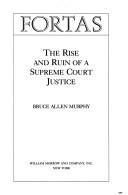| Listing 1 - 3 of 3 |
Sort by
|

ISBN: 0688053572 Year: 1988 Publisher: New York William Morrow
Abstract | Keywords | Export | Availability | Bookmark
 Loading...
Loading...Choose an application
- Reference Manager
- EndNote
- RefWorks (Direct export to RefWorks)
Kennedy, John Fitzgerald --- Nixon, Richard Milhous --- Roosevelt, Franklin Delano --- Thurmond, Strom --- Douglas, William Orville --- Vietnam War, 1961-1975 --- New York Times --- New Deal, 1933-1939

ISBN: 0807875449 9780807875445 0807825948 9780807825945 0807849103 9780807849101 9798890870834 Year: 2001 Publisher: Chapel Hill : University of North Carolina Press,
Abstract | Keywords | Export | Availability | Bookmark
 Loading...
Loading...Choose an application
- Reference Manager
- EndNote
- RefWorks (Direct export to RefWorks)
In 1948 a group of conservative white southerners formed the States' Rights Democratic Party, soon nicknamed the "Dixiecrats". This volume situates the Dixiecrat movement within the tumultuous social and economic milieu of the 1930's and 1940's South.
Elite (Social sciences) --- Presidents --- Elites (Social sciences) --- Leadership --- Power (Social sciences) --- Social classes --- Social groups --- Political activity --- History --- Election --- States' Rights Democratic Party --- States' Rights Democrats --- Dixiecrats --- History. --- Southern States --- United States --- American South --- American Southeast --- Dixie (U.S. : Region) --- Former Confederate States --- South, The --- Southeast (U.S.) --- Southeast United States --- Southeastern States --- Southern United States --- United States, Southern --- Politics and government --- Race relations --- Political aspects. --- 1951 --- -Southern States --- 1865-1950 --- Political aspects --- 20th century --- 1948 --- 1933-1945 --- 1945-1989 --- Thurmond, Strom --- Truman, Harry S.
Book
ISBN: 069122787X Year: 2004 Publisher: Princeton, N.J. : Princeton University Press,
Abstract | Keywords | Export | Availability | Bookmark
 Loading...
Loading...Choose an application
- Reference Manager
- EndNote
- RefWorks (Direct export to RefWorks)
This comprehensive and in-depth look at southern politics in the United States challenges conventional notions about the rise of the Republican Party in the South. David Lublin argues that the evolution of southern politics must be seen as part of a process of democratization of the region's politics. The Voting Rights Act of 1965 provided a sharp jolt forward in this process by greatly expanding the southern electorate. Nevertheless, Democrats prevented Republicans from capitalizing rapidly on these changes. The overwhelming dominance of the region's politics by Democrats and their frequent adoption of conservative positions made it difficult for the GOP to attract either candidates or voters in many contests. However, electoral rules and issues gradually propelled the Democrats to the Left and more conservative white voters and politicians into the arms of the Republican Party. Surprisingly, despite the racial turmoil of the civil rights era, economic rather than racial issues first separated Democrats from Republicans. Only later did racial and social issues begin to rival economic questions as a source of partisan division and opportunity for Republican politicians.
Party affiliation --- Conservatism --- Republican Party (U.S. : 1854- ) --- Southern States --- Race relations --- Political aspects. --- Politics and government --- Alabama. --- Appalachia. --- Arkansas. --- Baptists. --- Civil War. --- Emancipation Proclamation. --- Fifteenth Amendment. --- Florida. --- Georgia. --- Goldwater, Barry. --- Great Depression. --- Holton, Linwood. --- Jews. --- Johnson, Lyndon. --- King, Gary. --- Kousser, J. Morgan. --- Latinos. --- Louisiana. --- Massachusetts. --- Mexican Americans. --- Mississippi. --- National Voter Registration Act. --- New Deal. --- Norwood, Charles. --- O’Connor, Sandra Day. --- Pennsylvania. --- Reconstruction. --- Thurmond, Strom. --- abortion. --- affirmative action. --- biracial coalitions. --- candidate pool. --- candidate quality. --- corruption. --- dealignment. --- democratization. --- disfranchisement. --- double crossovers. --- dual campaigns. --- economic issues. --- elites. --- gay rights. --- independents. --- initiative. --- institutions. --- open seats. --- partisanship. --- party organizations. --- polarization. --- racial context. --- realignment. --- school prayer. --- social issues.
| Listing 1 - 3 of 3 |
Sort by
|

 Search
Search Feedback
Feedback About
About Help
Help News
News